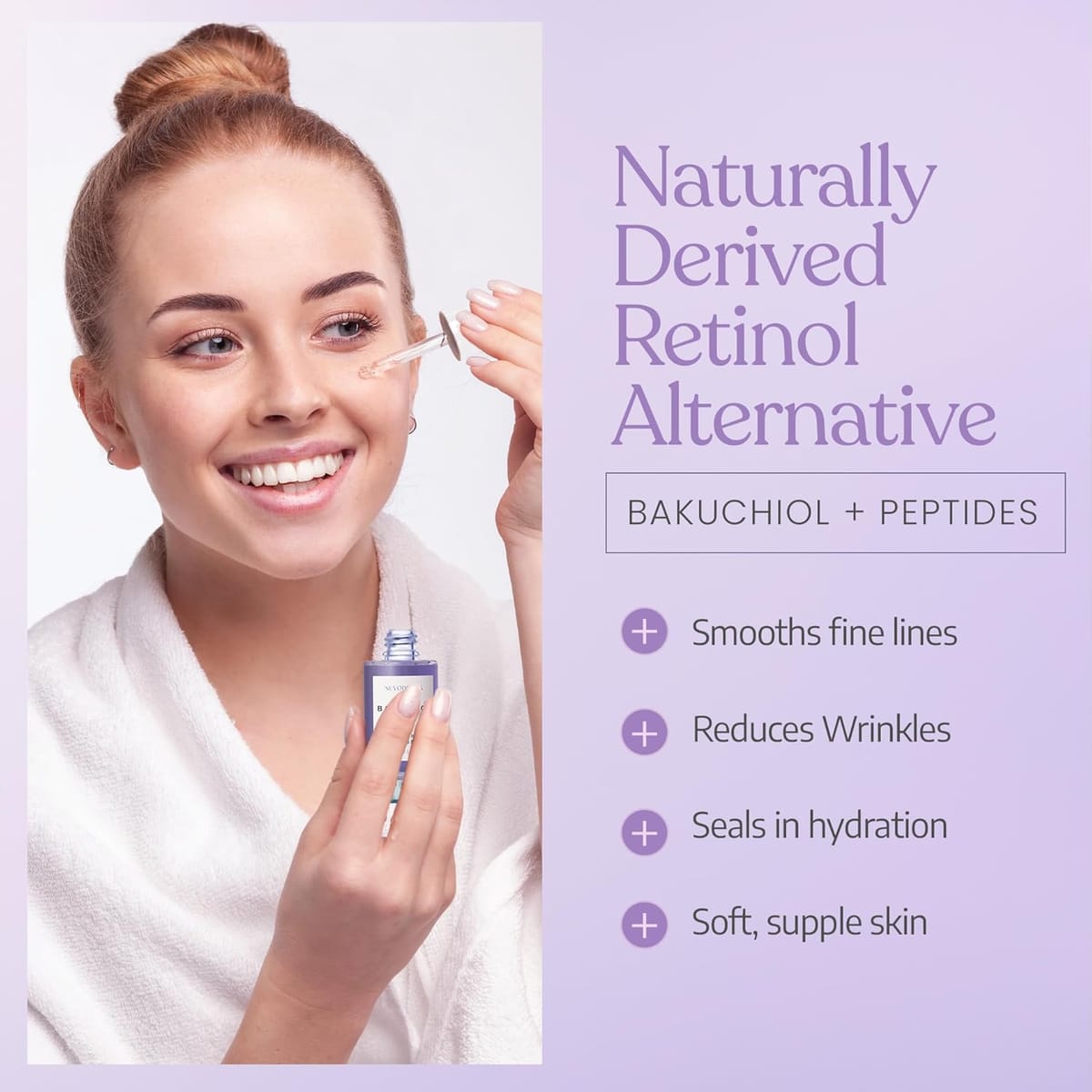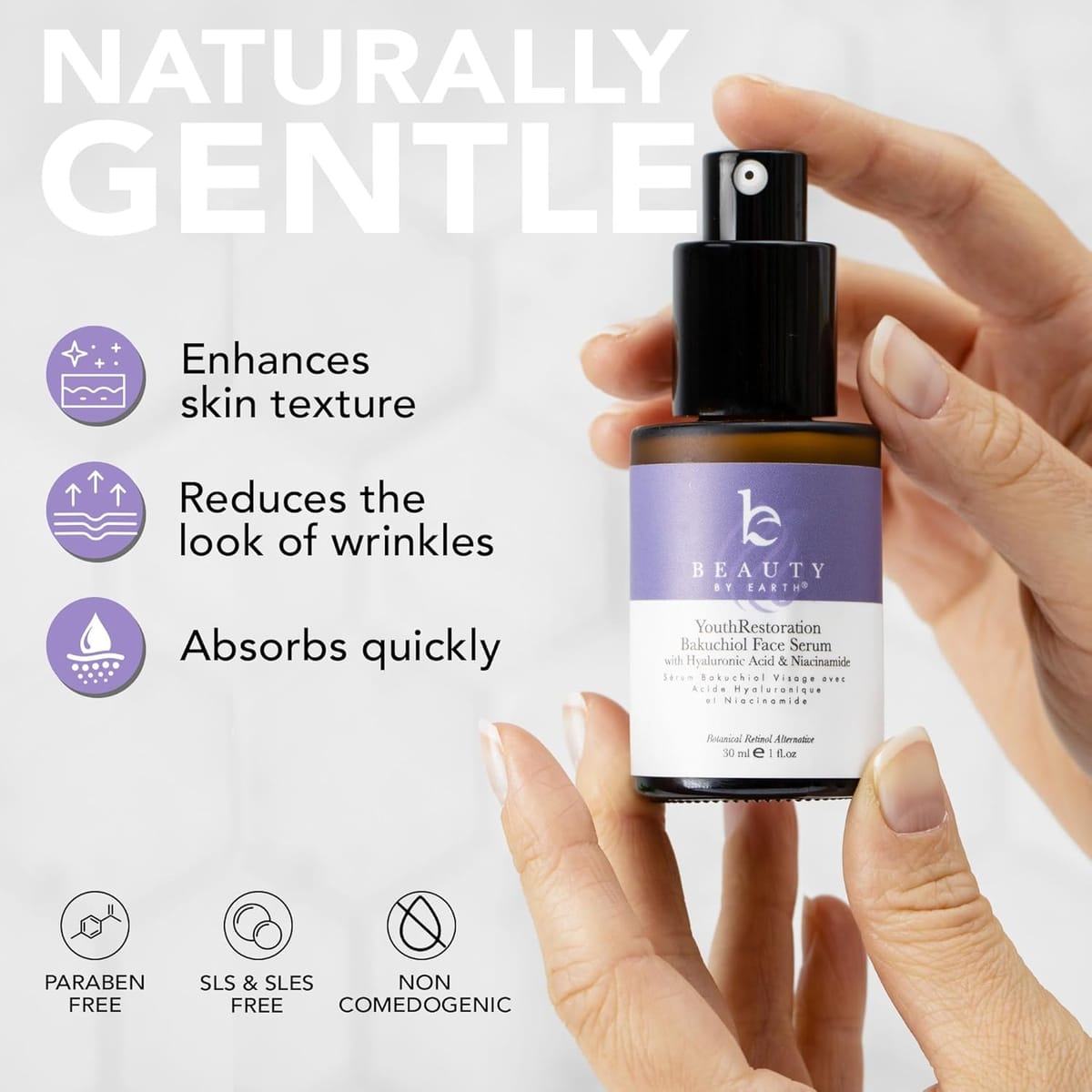Key Takeaways:
- Bakuchiol and Retinol: Both are powerful skincare ingredients with anti-aging benefits, but they differ in their origin and side effects.
- Skin Sensitivity: Bakuchiol is a gentler alternative to retinol, making it suitable for sensitive skin types.
- Efficacy: Both ingredients stimulate collagen production and improve skin texture, but bakuchiol offers these benefits with less irritation.
Introduction
In the ever-evolving landscape of skincare two ingredients have garnered significant attention for their anti-aging properties: bakuchiol and retinol. While retinol has long been hailed as the gold standard in anti-aging skincare, bakuchiol has emerged as a natural alternative, promising similar benefits without the harsh side effects. This article delves into the nuances of bakuchiol serum vs retinol, helping you make an informed choice for your skincare routine.
What is Retinol?
Retinol, a derivative of vitamin A, is a well-established ingredient in the skincare industry. It is well known for its capacity to increase the production of collagen, which lessens the visibility of wrinkles and fine lines. Retinol helps in accelerating skin cell turnover, which leads to a smoother and more youthful complexion.
However, retinol is not without its drawbacks. It can cause skin irritation, dryness, and increased sensitivity to sun exposure. These side effects make it less suitable for sensitive skin types and those new to anti-aging skincare products.
What is Bakuchiol?
Bakuchiol is a plant-based retinol alternative derived from the seeds of the Psoralea corylifolia plant. Unlike retinol, bakuchiol is naturally derived and has been used in traditional medicine for its healing properties. Recent studies have shown that bakuchiol offers similar anti-aging benefits to retinol, such as stimulating collagen production and improving skin texture.
One of the most significant advantages of bakuchiol is its gentler profile. It is less likely to cause skin irritation, making it an excellent option for those with sensitive skin or those who cannot tolerate retinol.
Chemical Structures and Mechanisms
Retinol and bakuchiol differ significantly in their chemical structures. Retinol is a vitamin A derivative that works by binding to retinoic acid receptors in the skin. This binding action stimulates collagen production and accelerates skin cell turnover, leading to improved skin texture and reduced fine lines.
Bakuchiol, on the other hand, is a retinol-like functional compound but does not share the same chemical structure. Despite this, it has been shown to activate similar pathways in the skin, leading to comparable anti-aging effects. This makes bakuchiol a compelling natural alternative to retinol.
Anti-Aging Benefits
Both bakuchiol and retinol are celebrated for their anti-aging benefits. Retinol is clinically proven to reduce the appearance of fine lines and wrinkles, improve skin tone, and enhance overall skin texture. It achieves this by stimulating collagen production and accelerating skin cell turnover.
Bakuchiol offers similar anti-aging benefits but with a gentler touch. Studies have shown that bakuchiol can reduce the appearance of fine lines and wrinkles, improve skin tone, and enhance skin texture without causing the irritation often associated with retinol. This makes it an attractive option for those seeking effective anti-aging skincare without the side effects.
Skin Sensitivity and Tolerance
One of the most significant differences between bakuchiol and retinol is their impact on skin sensitivity. Retinol is known for causing skin irritation, dryness, and increased sensitivity to UV rays. These side effects can be particularly problematic for those with sensitive skin or those new to retinol.
Bakuchiol, however, is much gentler on the skin. It is less likely to cause irritation, making it suitable for sensitive skin types. This increased skin tolerance makes bakuchiol an excellent option for those who cannot tolerate retinol but still want to enjoy its anti-aging benefits.
Acne-Prone Skin
Retinol is often recommended for acne-prone skin due to its ability to accelerate skin cell turnover and prevent clogged pores. It can also help reduce the appearance of acne scars and improve overall skin texture. However, the irritation caused by retinol can sometimes exacerbate acne, making it a double-edged sword for those with sensitive skin.
Bakuchiol, with its antibacterial properties, offers a gentler alternative for acne-prone skin. It helps in reducing acne and improving skin texture without causing the irritation associated with retinol. This makes bakuchiol a suitable option for those with acne-prone and sensitive skin.
Sun Sensitivity
One of the significant drawbacks of retinol is its tendency to increase sun sensitivity. This means that those using retinol must be diligent about applying sunscreen and avoiding excessive sun exposure to prevent sun damage. This increased sun sensitivity can be a limiting factor for those who spend a lot of time outdoors.
Bakuchiol does not increase sun sensitivity, making it a more convenient option for those concerned about sun exposure. This allows users to enjoy the anti-aging benefits of bakuchiol without the added worry of increased sun sensitivity.
Skin Hydration
Retinol can sometimes lead to dry skin due to its exfoliating properties. This can be a concern for those with already dry or sensitive skin. To counteract this, it is often recommended to use retinol in conjunction with hydrating ingredients like hyaluronic acid and aloe vera.
Bakuchiol, on the other hand, is less likely to cause dryness. It helps keep the skin hydrated while delivering its anti-aging benefits. This makes bakuchiol a more suitable option for those with dry or sensitive skin who want to avoid the drying effects of retinol.
Natural Ingredients
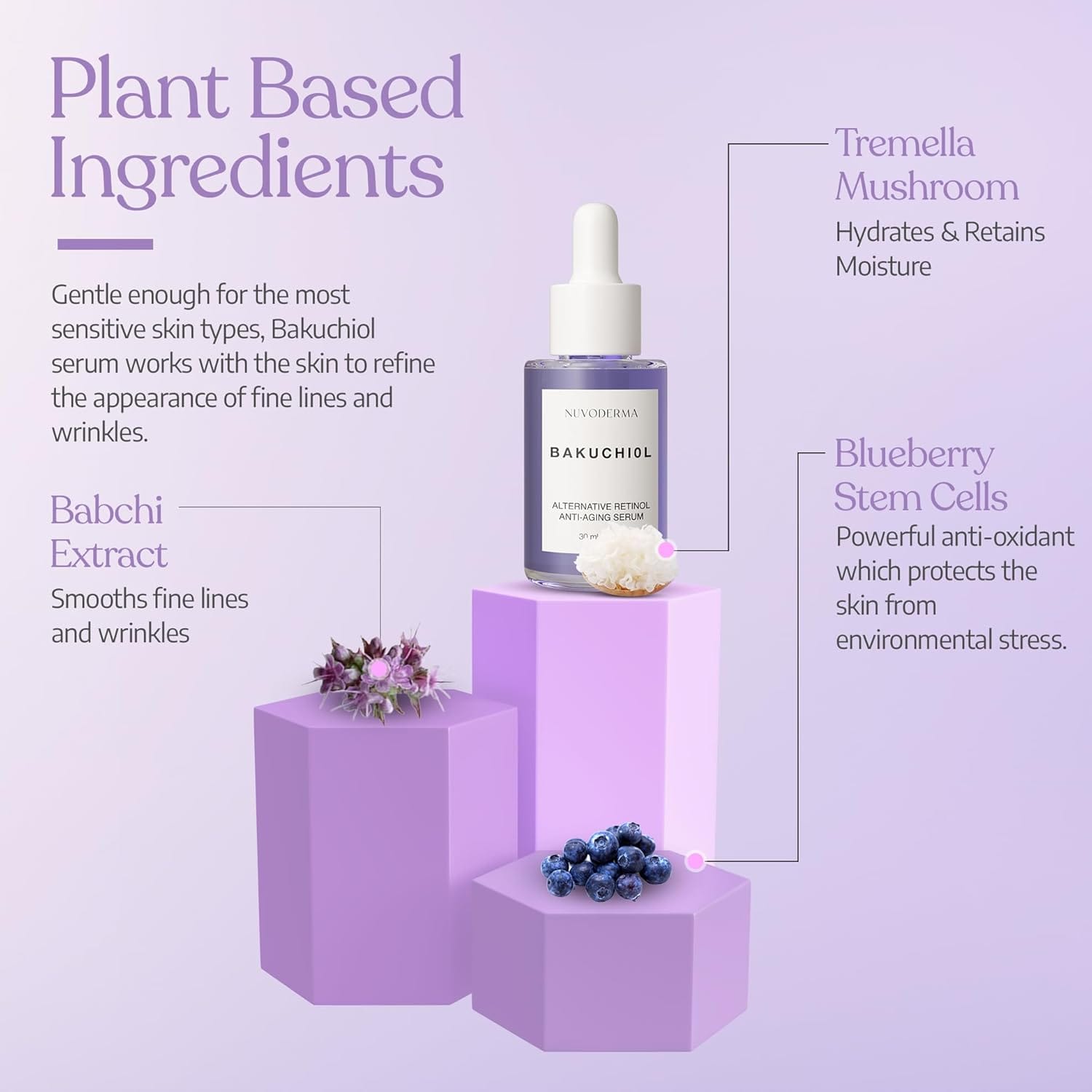
For those seeking skincare products with natural ingredients, bakuchiol is an appealing option. Derived from the Psoralea corylifolia plant, bakuchiol is a naturally derived ingredient with a long history of use in traditional medicine. This plant-based retinol alternative offers a more natural approach to anti-aging skincare.
Retinol, while effective, is a synthetic derivative of vitamin A. For those who prefer natural ingredients in their skincare routine, bakuchiol provides a compelling alternative with similar anti-aging benefits.
Combining Bakuchiol and Retinol
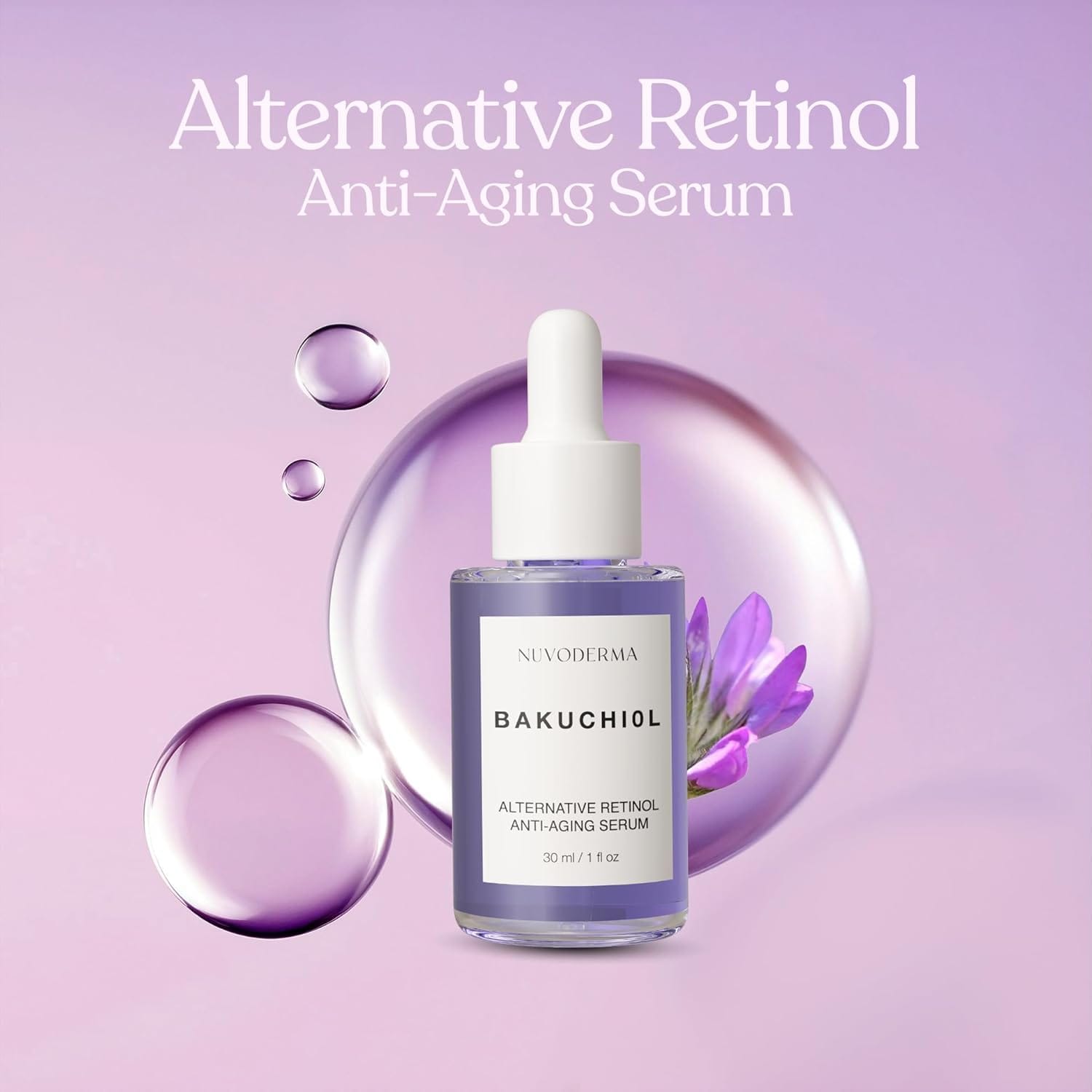
For those looking to maximize their anti-aging skincare routine, combining bakuchiol and retinol can be an effective strategy. Bakuchiol can help mitigate the irritation caused by retinol, allowing users to enjoy the benefits of both ingredients. This combination can be particularly beneficial for those with sensitive skin who want to incorporate retinol into their routine.
When combining these ingredients, it is essential to start with a patch test to ensure skin tolerance. Gradually introducing both ingredients into your skincare routine can help minimize the risk of irritation and maximize the benefits.
Addressing Fine Lines and Wrinkles
Both bakuchiol and retinol are effective in addressing fine lines and wrinkles. Retinol reduces the look of fine lines and wrinkles by speeding up the turnover of skin cells and increasing the production of collagen. However, its potential for causing irritation can be a drawback for some users.
Bakuchiol offers a gentler approach to addressing fine lines and wrinkles. It stimulates collagen production and improves skin texture without causing the irritation often associated with retinol. This makes bakuchiol a suitable option for those looking to address fine lines and wrinkles without the risk of irritation.
Improving Skin Texture
Improving skin texture is a common goal in anti-aging skincare. Retinol is well-known for its ability to enhance skin texture by accelerating skin cell turnover and stimulating collagen production. This leads to a smoother and more youthful complexion.
Bakuchiol also excels in improving skin texture. Studies have shown that bakuchiol can enhance skin texture by stimulating collagen production and promoting healthy skin cell turnover. This makes bakuchiol an effective and gentle option for those looking to improve their skin texture.
Reducing Dark Spots
Dark spots and hyperpigmentation are common skin issues that can be addressed with both retinol and bakuchiol. Retinol helps reduce dark spots by accelerating skin cell turnover and promoting the shedding of pigmented skin cells. However, its potential for causing irritation can be a concern for some users.
Bakuchiol offers a gentler approach to reducing dark spots. It helps promote healthy skin cell turnover and reduce hyperpigmentation without causing irritation. This makes bakuchiol a suitable option for those looking to address dark spots and hyperpigmentation without the risk of irritation.
Enhancing Skin Tone
An even skin tone is a key aspect of a healthy and youthful complexion. Retinol is effective in enhancing skin tone by promoting skin cell turnover and reducing hyperpigmentation. However, its potential for causing irritation can be a drawback for some users.
Bakuchiol offers a gentler approach to enhancing skin tone. It helps promote healthy skin cell turnover and reduce hyperpigmentation without causing irritation. This makes bakuchiol a suitable option for those looking to enhance their skin tone without the risk of irritation.
Skin Hydration and Moisture Retention
Maintaining skin hydration is essential for a healthy and youthful complexion. Retinol can sometimes lead to dry skin due to its exfoliating properties. To counteract this, it is often recommended to use retinol in conjunction with hydrating ingredients like hyaluronic acid and aloe vera.
Bakuchiol, on the other hand, is less likely to cause dryness. It helps keep the skin hydrated while delivering its anti-aging benefits. This makes bakuchiol a more suitable option for those with dry or sensitive skin who want to avoid the drying effects of retinol.
Skin Purging and Initial Reactions
When introducing new skincare ingredients like retinol or bakuchiol, it is common to experience an initial period of skin purging. This occurs as the skin adjusts to the new ingredient and accelerates the shedding of dead skin cells. While this can be a temporary inconvenience, it is often a sign that the ingredient is working.
Bakuchiol is less likely to cause severe skin purging compared to retinol. This makes it a gentler option for those new to anti-aging skincare products. However, it is still essential to start with a patch test and gradually introduce bakuchiol into your skincare routine to minimize the risk of initial reactions.
Incorporating Bakuchiol and Retinol into Your Skincare Routine



Incorporating bakuchiol or retinol into your skincare routine requires careful consideration. Both ingredients can deliver significant anti-aging benefits, but their potential for causing irritation means that they should be introduced gradually. Start with a patch test to ensure skin tolerance and gradually increase the frequency of use.
For those with sensitive skin, bakuchiol offers a gentler option that can be used daily without the risk of irritation. Retinol, on the other hand, may require a more cautious approach, with usage limited to a few times a week initially.
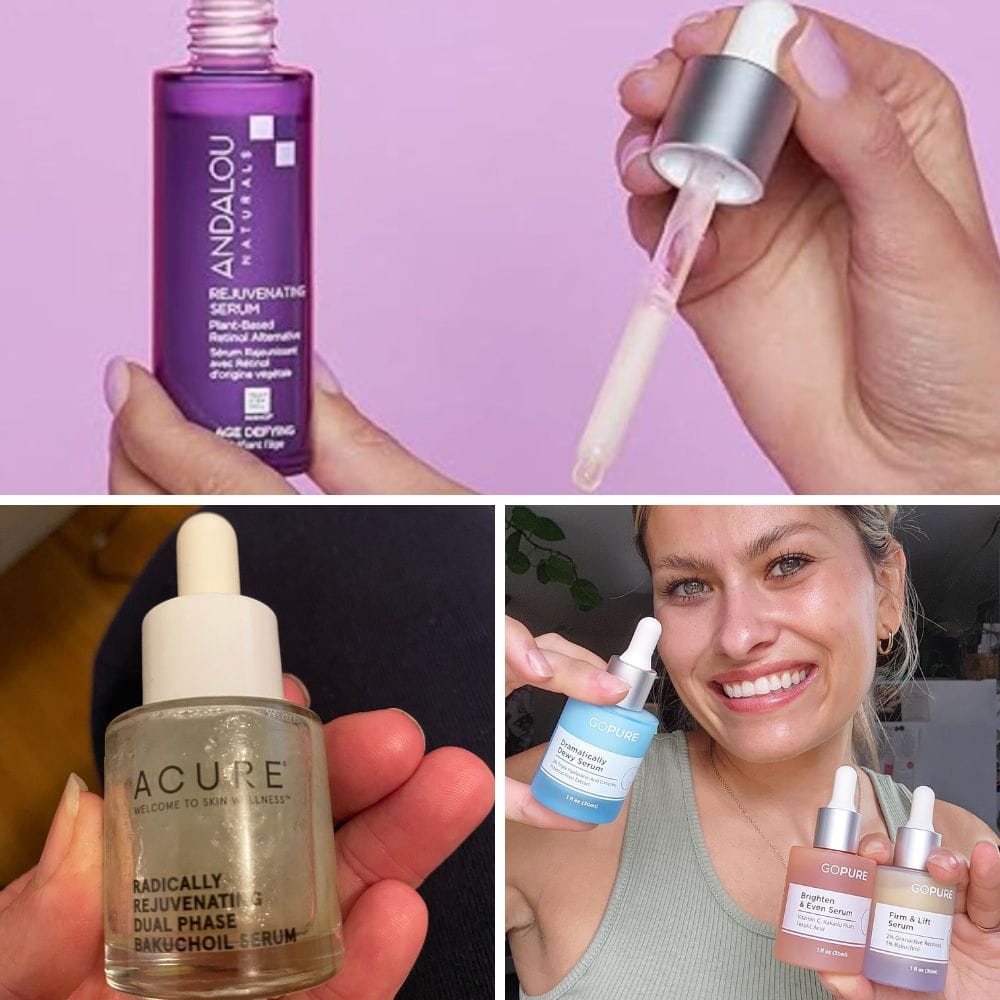

Can I use bakuchiol and retinol together?
Yes, you can use bakuchiol and retinol together. Combining these ingredients can help mitigate the irritation caused by retinol while maximizing the anti-aging benefits. Start with a patch test and gradually introduce both ingredients into your skincare routine to ensure skin tolerance.
Is bakuchiol suitable for all skin types?
Bakuchiol is suitable for all skin types, including sensitive skin. Its gentle profile makes it an excellent option for those who cannot tolerate retinol but still want to enjoy its anti-aging benefits.
How long does it take to see results with bakuchiol?
Results with bakuchiol can vary depending on individual skin types and concerns. However, most users can expect to see improvements in skin texture, tone, and the appearance of fine lines and wrinkles within 12 weeks of consistent use.

Bakuchiol and retinol are both powerful anti-aging ingredients with unique benefits and drawbacks. Retinol is a well-established ingredient known for its ability to stimulate collagen production and improve skin texture. However, its potential for causing irritation and increased sun sensitivity can be a concern for some users.
Bakuchiol, as a natural alternative, offers similar anti-aging benefits without the associated side effects. It is gentler on the skin, making it suitable for sensitive skin types and those new to anti-aging skincare products. By understanding the differences between bakuchiol and retinol, you can make an informed choice that best suits your skincare needs.
